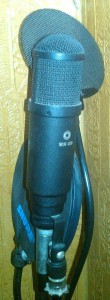(Disclaimer: I am not a regular in the studio. I do just enough work to allow me to take an extra vacation every year. Others may/will differ with my opinions and have different experiences in this field. You have been warned.)
Part 3 in the voice over march to boredom.
I know some of you are just skipping right to the tuba videos. That’s fine. But today’s installment will save voice over talents a lot of money, embarrassment, and agony down the road. It’s all about doing your “demo” and doing it right.
Just for the sake of argument let’s presume that you’ve made it through enough acting classes that you have a level of confidence somewhat higher than whale poop in the Marianas Trench. You’re ready to go out and get work as a voice talent! No you aren’t.
Standing in front of that microphone in your classroom for a whopping 10 hours over the last ten weeks didn’t prepare you for what you’re going to face. For starters, how versatile are you? Can you do anything but a straight read of simple copy? Can you do a respectable accent? What about cartoon voices? High register or low register? Are you ready to work with another actor and not walk all over each other? Or, perhaps more importantly, are you ready to work with another actor, take direction, and walk over each other just the right amount? Mind you, most of the “mixed audio” can be fixed in post production. But you have to build the sense of timing that is required to sound like it’s happening live. You have to keep the same level of enthusiasm and energy through dozens of takes and one-line repeats. It’s not uncommon to do a whole dialogue and find the man on the board or the client asking you to read just one line differently. It has to sound like the stuff that came before it if they are going to edit it into the mix. And that’s a demanding skill.
How do you get these skills? For starters you need to find a partner or two to practice with on a regular basis. Maybe it’s someone in your class that wants to work with you every week. Perhaps it’s a theater group where you can run lines with someone. You won’t be in the play, but you help the actors memorize their lines. You grow from that experience as well. Or, you can really luck out and do what I did: read books for the blind.
To hop back to the Christian nature of this blog for a moment, what could be better than serving a brother or sister in need while improving your skills? I’ve read plenty of books for the blind, and not just in a formal setting. One year for Christmas I asked a blind friend what books they’d like read for them. No having to wait for anyone to get to it, I churned the book out in a few weeks. It was a gift of love. And to this day she probably still laughs at this silly white boy reading Steve Harvey’s book just for her.
But I suspended the reality of who I was while I read it for her. She told me that she’d forever hear my voice when Steve was talking. That’s pretty cool. All of my reading for the blind was interesting. I read everything from technical manuals on the Australian phone network’s bar switching system of the 1960’s (obscure, I’ll grant you, but that degree in computer science/telecommunications finally paid off) to sex offender manuals for the state prison. I read books on the feminist nature of the Queen in the history of the game of chess and electrical code manuals. I read the newspaper live on the radio and I read high school history books. I read it all.
And during that experience I strengthened my voice to the point where I could walk into a studio and work for two hours without a worry. I learned that this “talking” job was tough. I couldn’t talk for more than 2 hours nonstop when I started. And now I can (and there’s plenty of people who will sadly vouch for this) talk for hours and hours and hours… You need that ability to do a good job recording.
And that’s the point of today’s missive. You will eventually do that “demo” I mentioned earlier. Find a good studio to record in and ask questions. Make sure that you get a good engineer and that they will do the music and background noise for your recording. Make sure that the price is reasonable as well. Most studios will give aspiring talents a good rate with the understanding that they are also scouting talent. So don’t appear in front of that talent scout until you’re ready. Spend enough time to prepare 20 different commercials/industrial reads (reading technical material) and possibly an audio book before you even think about booking time. Rehearse it until you can do it in your sleep. And the get some sleep before going to the studio.
Don’t go dirt cheap on the studio. Lots of “schools” will record your demo. They usually stink. They do it in a room not designed for the recording of this kind of material and they don’t have the right equipment. Don’t record it on your uncle Lester’s gear he uses for his garage band. Find a competent professional who does commercial work. They are your best bet. Without them, you are probably wasting your money.
Take direction when you do your demo. I lucked out and the man who ran the board for me was an old pro in the area who’s now retired. He was a great director, thousands of hours in the studio. And he brought out the best in me. Here’s a link to my demo joecourtemancheaddemo. The only problem with it is the first spot is slow. That was not his fault, it was my choice. And I regret it today. He tried to warn me but I was too headstrong. But once you get past that it’s a great demo for a new artist. I’m still using it years later.
Here’s another thing you will want to do: get all the files in file format of the recording software as well as mp3/.wav format. That way you can manipulate them later.
And you have one more thing to do before you approach an agent – get a good “head shot” done so they know what you look like. Every agency will want one at some point, either for their website or their “book.” (It looks like mugshots of pretty people… until you get to my page. Big clients get a copy or online access so they can take a look at who’s available for work.)
Yes, people want to know what that voice looks like. Silly but it’s the plain truth. Don’t go get a glamour shot done with lots of cleavage (I tried it and it turned out funny.) Go to a professional who specializes in theatrical work. I use Jennifer Bong for my headshots. She even makes a clown like me look good. There’s an added bonus to this picture: it might land you some on camera work. I’ve done more than a few commercials and modeling jobs based on my voice over photo. I filled a need I didn’t even know existed. So go get that picture done before you start banging on doors. It shouldn’t cost more than $300 to get it done including rights to the picture. Be very wary of agencies that “require” you use their photographer. Reputable talent agents will not do that to you.
Now you’re ready to go out and land an agent or some work. What kind of niche does your voice fit into? Are you going to do technical reads or zany commercials? Will books be the venue for you? These are all questions to contemplate before Monday’s installment. And now on to tubas.

